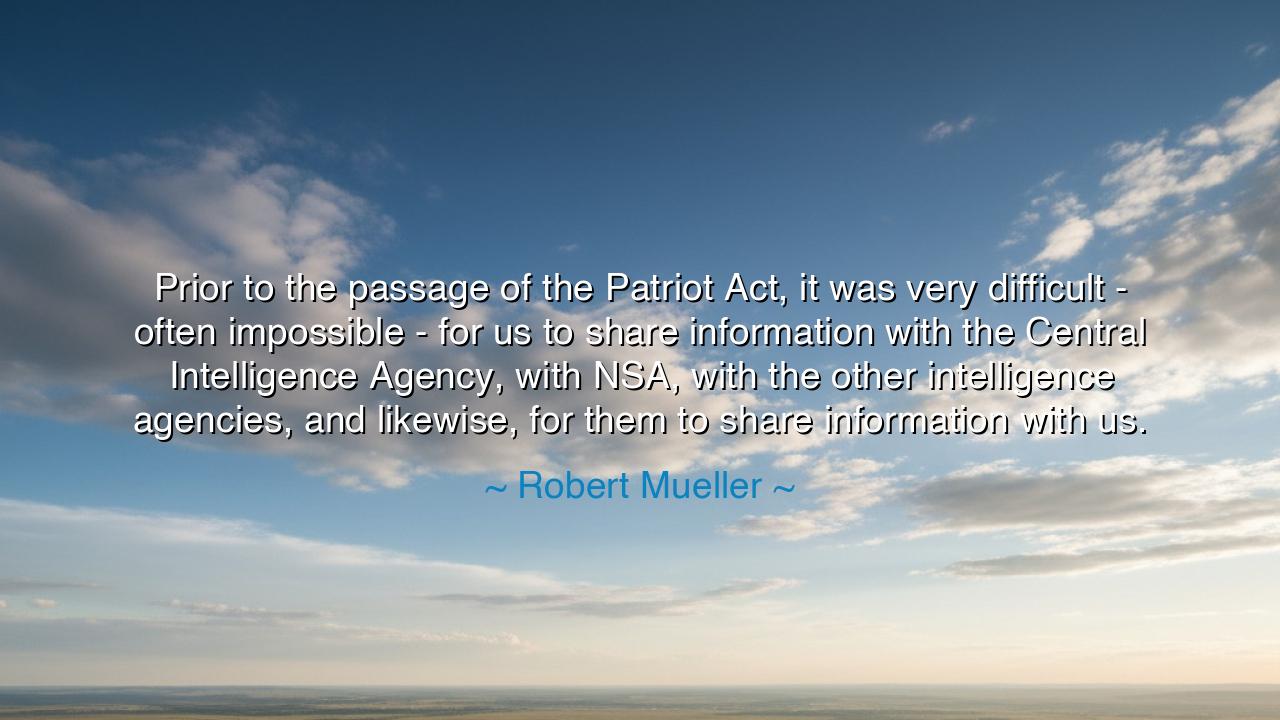
Prior to the passage of the Patriot Act, it was very difficult -
Prior to the passage of the Patriot Act, it was very difficult - often impossible - for us to share information with the Central Intelligence Agency, with NSA, with the other intelligence agencies, and likewise, for them to share information with us.






“Prior to the passage of the Patriot Act, it was very difficult — often impossible — for us to share information with the Central Intelligence Agency, with NSA, with the other intelligence agencies, and likewise, for them to share information with us.” Thus spoke Robert Mueller, the man who guided the FBI through one of the darkest and most transformative chapters in modern history. His words echo not only the challenges of his time, but the timeless truth that division weakens defense, and that knowledge, when hoarded, becomes powerless. In this reflection, Mueller reveals both a lament and a lesson — that unity of intelligence is not merely a bureaucratic goal, but a moral and strategic necessity for the survival of a free and secure people.
The quote finds its origin in the aftermath of the September 11, 2001 attacks, when the world awoke to a new kind of warfare — one without battlefields, borders, or uniforms. In those harrowing days, the FBI, CIA, and NSA each possessed fragments of truth — pieces of a dark puzzle that, if joined sooner, might have prevented the catastrophe. But walls stood between them: walls of law, of pride, of institutional habit. Each guarded its secrets as treasure, not realizing that in the age of hidden enemies, isolation was no longer strength, but blindness. Thus, Mueller’s words describe not mere inconvenience, but a systemic failure of unity, one that cost thousands of innocent lives and altered the course of nations.
When Mueller speaks of the Patriot Act, he refers to the law that followed the tragedy — an attempt to dissolve the barriers that had kept intelligence agencies apart. It was a moment of reckoning, when a nation long divided by caution and legal restraint was forced to face the truth: that information locked away is information lost. The sharing of intelligence, once feared as dangerous to liberty, was now seen as essential to preserving it. The act itself became a symbol of the eternal struggle between freedom and security, between the need for vigilance and the duty to protect the privacy of the innocent.
To grasp the full weight of Mueller’s message, one must look beyond his age to the ancient principle it reflects: cooperation in the face of danger. In the days of the Greek city-states, when Persia’s vast armies threatened to engulf them, the Greeks learned the cost of division. Athens, proud of its navy, and Sparta, proud of its discipline, long mistrusted one another. But when the enemy’s shadow fell upon them both, they joined forces at Salamis and Plataea, and their unity saved them. Just as the Greek alliance triumphed over tyranny through cooperation, so too must institutions of intelligence stand together if they are to safeguard civilization from unseen threats.
Yet, there is wisdom — and warning — in Mueller’s words. For while the union of intelligence strengthens a nation, it also demands responsibility, restraint, and virtue. To share knowledge is to wield immense power — and power without conscience leads to oppression. The challenge, therefore, is not only to connect the agencies of the state, but to bind them with integrity, ensuring that the shield of information does not become a sword against the very people it was meant to defend. In this balance lies the moral burden of leadership: to be vigilant without becoming tyrannical, to be transparent within the circle of trust but humble before the rights of the governed.
In this light, Mueller’s reflection is not just about intelligence agencies — it is about human collaboration itself. Every community, every company, every family faces the same choice between silence and sharing, between fragmentation and unity. Knowledge, when held in isolation, breeds confusion and suspicion; but when shared wisely, it becomes wisdom. Just as the watchmen on different towers must call out to one another when danger approaches, so too must all who serve truth learn to communicate openly, lest the enemy of misunderstanding prevail.
Therefore, O listener, take this teaching into your own life: break down the walls that divide. Whether between institutions, between peoples, or within your own heart, the failure to share — to trust, to connect — leads only to loss. Let truth flow where it is needed; let cooperation replace competition when the stakes are higher than pride. For as Mueller teaches, intelligence without unity is impotence, and vigilance without cooperation is folly.
In the end, his words call us to a higher form of wisdom: to recognize that safety is not the absence of danger, but the presence of shared understanding. When knowledge becomes collective, when minds work as one toward the defense of what is good, then even in the face of darkness, the light endures. And so, let us remember — whether in the governance of nations or the governance of the soul — that unity of purpose, guided by truth and integrity, is the mightiest defense under the heavens.






AAdministratorAdministrator
Welcome, honored guests. Please leave a comment, we will respond soon